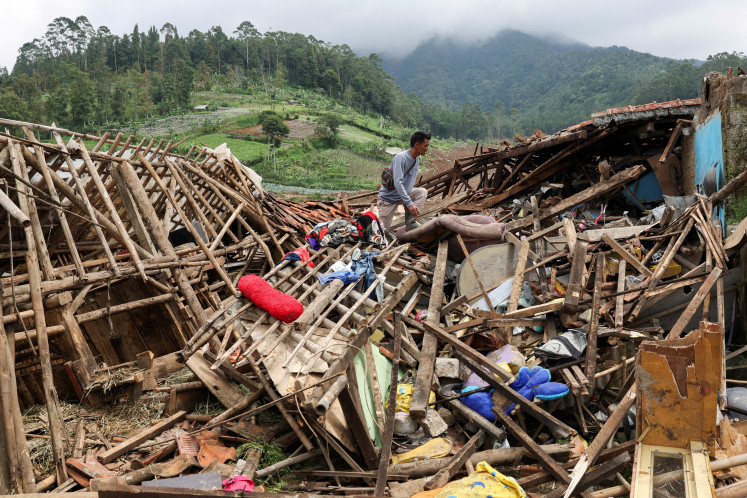Popular Reads
Top Results
Can't find what you're looking for?
View all search resultsPopular Reads
Top Results
Can't find what you're looking for?
View all search resultsGovt seeks to revoke divisive local bylaws
The Home Ministry is planning to curb discriminatory bylaws that have become the source of conflict in regions throughout the archipelago
Change text size
Gift Premium Articles
to Anyone
T
he Home Ministry is planning to curb discriminatory bylaws that have become the source of conflict in regions throughout the archipelago.
The ministry revealed the plan following a recent clash in Tolikara, Papua, which was said to be driven by a rumored bylaw in the region that limits religious activities of minority groups.
Home Minister Tjahjo Kumolo said that he had instructed local officials and legislators to set up a special committee to further investigate it due to debates among local authorities over the existence of such bylaws.
At the same time, Tjahjo said that his office was heightening efforts to evaluate other existing bylaws in order to avoid similar incidents common in other parts of the country.
'I want to underline that Indonesia is not a religiously-based country. It is based on Pancasila. We have laws concerning religion and other issues. All bylaws thus must refer to them,' Tjahjo said at his office on Wednesday.
According to Tjahjo, his office has identified 139 problematic bylaws that were issued between November last year and May, which violate the law and are considered a threat to the Unitary State of the Republic of Indonesia (NKRI), and thus need revision.
The Home Ministry is currently evaluating another 70 bylaws, said the politician from the ruling Indonesian Democratic Party of Struggle (PDI-P).
However, he did not elaborate on the details of such bylaws, only citing a bylaw that bans women in Aceh to go out after 11 p.m. as an example, and further highlighting that discriminatory bylaws would jeopardize the identity of the NKRI if ignored.
The ministry has never revealed details of bylaws that have been issued until today, such as the exact number of existing bylaws and how many of which have been deemed problematic and why.
Different groups however have presented their own studies on the bylaws.
The National Commission on Violence Against Women (Komnas Perempuan), for example, announced in March that it had indicated as many as 365 bylaws in Aceh, West Sumatra, West Java and Sulawesi that are discriminatory against women and other minority groups.
Some controversial bylaws that have reached the public's attention include a regulation issued in 2009 that gives the Gorontalo government in North Sulawesi the authority to build values of community life based on the teachings of Islam, a bylaw issued in 2012 that requires Koran literacy mandatory in Gorontalo, a 2012 bylaw that obliges students in Tasikmalaya, West Java, to attend Islamic Religious classes and a 2012 bylaw issued by Bandung authorities that mandates elementary school students learn at the Diniyah Takmiliyah, a non-formal Islamic education institution, as a complement to general education.
Siti Zuhro from the Indonesian Institute of Sciences (LIPI) said that Indonesia should expect consequences from problematic bylaws that have been ignored by the government for years.
'Discussion on problematic bylaws only emerges when an incident, such as the recent one in Tolikara, occurs. We have no comprehensive system to anticipate regulations from being violated,' she said.
Besides omission by the central government, she also blamed the growing discriminatory bylaws on the lack of coordination between central and regional governments following the implementation of decentralization.
'The [central] government must not leave regional governments without assistance or monitoring. I personally believe that regional governments know well that all regulations they issue in regions must comply with the higher laws. That is why close monitoring by the central government is necessary,' Siti highlighted.










